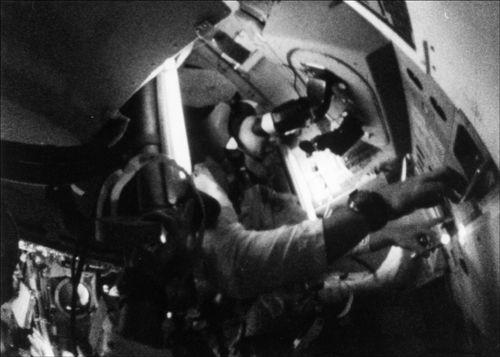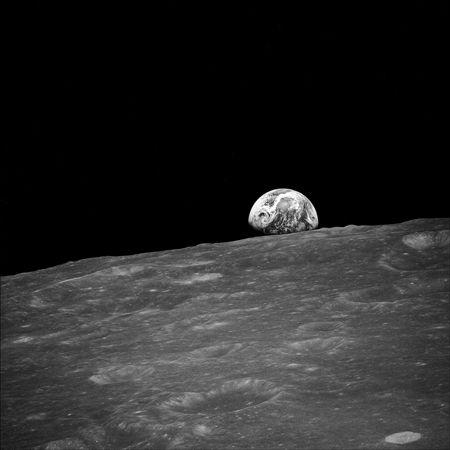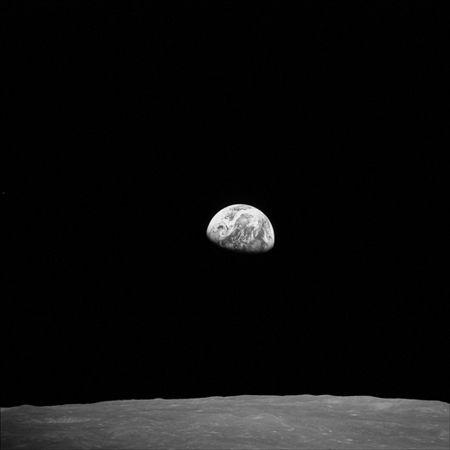Neil Armstrong: A Life of Flight (27 page)
Read Neil Armstrong: A Life of Flight Online
Authors: Jay Barbree
Tags: #Science, #Astronomy, #Biography & Autobiography, #Science & Technology

Neil knew in the astronauts’ service module was the SPS,
Apollo 8
’s largest rocket. It would be needed to reduce their speed to place them in lunar orbit, and then would ignite again to bring them safely home. The question in Mission Control was, “Is lunar orbit the safe thing to do?”
Neil also knew what the decision-makers must consider was critical not only to the mission but also to the lives of the three men. To slip
Apollo 8
into lunar orbit, the big SPS had to fire at full thrust for precisely 247 seconds. Following shutdown, the crew would use its attitude-control thrusters to point the nose of its ship in the direction of flight. If the engine burn faltered or failed early, the astronauts would soar past the moon on a path that would not return them to Earth. If the rocket burned too long,
Apollo 8
would crash somewhere on the lunar landscape.
If SPS failed to ignite altogether, or if Mission Control decided not to go for lunar orbit,
Apollo 8
would be perfectly safe. It would swing around the far side of the moon, curving in its sharp orbit as if it were a celestial boomerang and, without using an ounce of rocket fuel, the astronauts would be on their way home. This was the “Free Return Trajectory” inserted into
Apollo 8
’s computers before it left Earth.
Neil leaned back in his chair knowing this was Mission Control’s “moment of truth.” He also knew all the control center’s monitors were “green.”
* * *
Astronauts Frank Borman, Jim Lovell, and Bill Anders were ready for any emergency. They were about to disappear behind a 2,000-mile-wide celestial body—fly across the side of the moon facing away from Earth where signals between
Apollo 8
and Mission Control would be blocked for more than twenty minutes.
CapCom Jerry Carr received the nod. It was his job to give the astronauts their answer and everyone crossed his or her fingers to hear. “Ten seconds to go,” he told
Apollo 8
. “You are
Go
all the way.”
Jim Lovell’s voice was incredibly calm. “We’ll see you on the other side, Houston.”
With those words
Apollo 8
vanished behind Earth’s closest neighbor.
* * *
Neil listened. But there was nothing to hear. The mission had simply gone quiet. No communications. No telemetry signals. No way of knowing if the three astronauts continued to exist.
What Mission Control couldn’t know until
Apollo 8
emerged from behind the moon was at the precise moment dictated by its flight plan, Jim Lovell had fired
Apollo 8
’s biggest rocket for 247 seconds, a time he would later call the “longest four minutes I’ve ever spent.”

With the moon closer to them than Earth, the astronauts had a crater-potted lunar surface staring them in the face. (NASA)
It was a splendid, epochal moment sixty-nine hours and fifteen minutes after launching from Earth, and when the rocket burn was completed,
Apollo 8
had locked itself into lunar orbit.
* * *
Mission Control only knew it should have happened, and the flight controllers continued their cliff-hanging suspense, counting the minutes and seconds before
Apollo 8
would emerge from the other side of the moon.

Jim Lovell fires
Apollo 8
’s largest rocket engine and places humans in orbit around the moon. (NASA)
CapCom Jerry Carr could only keep up his persistent call, “
Apollo 8
…
Apollo 8
…
Apollo 8
…”
It seemed like an eternity but then the intense clock-watching was over. Headsets and speakers crackled, and Neil heard the voice of Jim Lovell calm as always, “Go ahead, Houston.”
Those three words—coming just at the instant they should have—sent Mission Control into a bedlam of cheering, whistling, shouting, and backslapping.
Apollo 8
’s telemetry flashed numbers on the big viewing board. It was in an orbit 60 by 168.5 miles above the moon. Later, on the third trip around the lunar surface, the ship’s big rocket fired again and dropped the astronauts into the desired, nearly circular orbit of 60.7 by 59.7 miles.
But the thrilled global audience didn’t want numbers. It wanted to know what the moon looked like.
“Essentially grey, no color,” reported lunar tour guide Jim Lovell. “It’s like plaster of Paris or a sort of greyish beach sand.”
In their first two telecasts, the astronauts transmitted video from lunar orbit of the wild and wondrous landscape pitted with massive craters. “It looks like a vast, lonely, forbidding place, an expanse of nothing,” said Borman as Lovell saw the distant Earth as a “grand oasis.”
The third member of the crew Bill Anders added, “You can see the moon has been bombarded through the eons with numerous meteorites. Every square inch is pockmarked.”
Lovell added, “The vast loneliness is awe-inspiring, and it makes you realize just what you have back there on Earth.”
* * *
That Christmas Eve in 1968 was extraordinary not just for Neil and Deke and the others in Mission Control, but for the billions that had been brought together before their television sets. They were seeing wondrous never-before-seen video of the moon moving quietly below
Apollo 8
’s lunar orbit when Bill Anders spoke: “For all the people on Earth,” he began soberly, “the crew of
Apollo 8
has a message we would like to send you.” He paused briefly and began reading from the verses of the book of Genesis: “In the beginning, God created the heaven and the Earth…” As Bill concluded the fourth verse, Jim Lovell read the next four with Frank Borman concluding with, “And God called the dry land Earth, and the gathering together of the waters He called seas. And God saw that it was good.”

Once in orbit around the moon, one of the first things seen by
Apollo 8
’s crew was Mother Earth rising above the lunar landscape. (NASA)

Earth, the place God took his time to make. (NASA)
The moon with its view of the distant, soft blue marble of life had become host to poets, and Borman signed off with, “And from the crew of
Apollo 8
, we close with good night, good luck, a Merry Christmas, and God bless all of you—all of you on the good Earth.”
* * *
Neil clutched his emotions thinking,
I hope my Mom saw this.
She would have enjoyed it he told himself rising from his chair.
His thoughts returned to the questions of the moment. If what he and Deke had been talking about came to be, he’d be there soon, possibly on the moon itself, and Neil went off to find Deke. They had agreed on a final meet.
The two found an out-of-the-way niche, again in the back of Mission Control. When each had their say Neil was content that Mike Collins and Buzz Aldrin would serve with him on
Apollo 11
. Jim Lovell, Bill Anders, and Fred Haise would be their backups.
“I’ll be announcing the crews next month,” Deke told Neil, and when I saw him later, Neil told me off the record he would likely command
Apollo 11
.
“Doesn’t surprise me a bit,” I nodded, smiling. “You are obviously the most qualified pilot. But possibly more important, you have the character and training to handle it.” “Maybe,” he said. “It was the luck of the draw.”
I knew this man standing before me never lobbied to make the first landing. He never sought any more consideration than his fellow astronauts, and I could only stare at him. I was amazed this humble man truly believed he was only selected because he was next in line.
I understood why the other astronauts believed that, but there was no question in my mind that the engine driving this selection was the NASA bosses’ awareness of Neil’s devotion to flying the Lunar Landing Training Vehicle until he had this landing on the moon thing nailed along with his incessant need to know what to expect. He simply had to be prepared for the unexpected.
“This is off the record,” I told Neil. “As you know Deke and our man Harold Williams are fishing buddies, and he told Harold straight out he wanted you first, and if you had to abort he knew Conrad could handle the job on
Apollo 12
, or if not Conrad, Jim Lovell could get it done on
13
.”
Neil gave me a little smile that said maybe yes or maybe no, and I stood there admiring the raw fairness of this man. I told him sincerely, “Neil you are too good. You are the most considerate person I’ve ever met, and you may not think you’re special but everybody else does. And dammit,” I raised my voice, “if you ever need me to run interference for you just let me know.”
Neil nodded and gave me the greatest compliment of my life. “I’d like you as my blocking back anytime,” he smiled.
“Just ask,” I said knowing the best part was that he was sincere.
Early in the morning of Christmas Day,
Apollo 8
moved through its tenth and final orbit around the moon and was again out of contact with Mission Control. The critical rocket firing would either start them on their journey home or leave them stranded in lunar orbit. At the appointed moment, Borman, Lovell, and Anders felt their big SPS rocket come to life, creating a long stream of flame and a wide plume of fire behind the engine. On the 304th second the engine shut down, right on the mark.
Time dragged maddeningly for a waiting world.
Finally, Jim Lovell’s voice came through with pure joy: “Please be informed there is a Santa Claus,” he said. “The burn was good.”
It was better than that. After twenty great hours in lunar orbit,
Apollo 8
was driving right down its own pioneered Earth to moon interstate, down the mathematical highway it had to fly to reach a point 400,000 feet above Earth—the exact angle and altitude to reenter with a speed greater than any human had ever flown.
Two-and-a-half-days after leaving the moon, Earth’s gravity reached out and dragged Borman, Lovell, and Anders back into its atmosphere with
Apollo 8
becoming a man-made meteor. Temperatures soared to those on the surfaces of stars, and plunging downward the astronauts knew their lives depended on how well their ship had been built.
